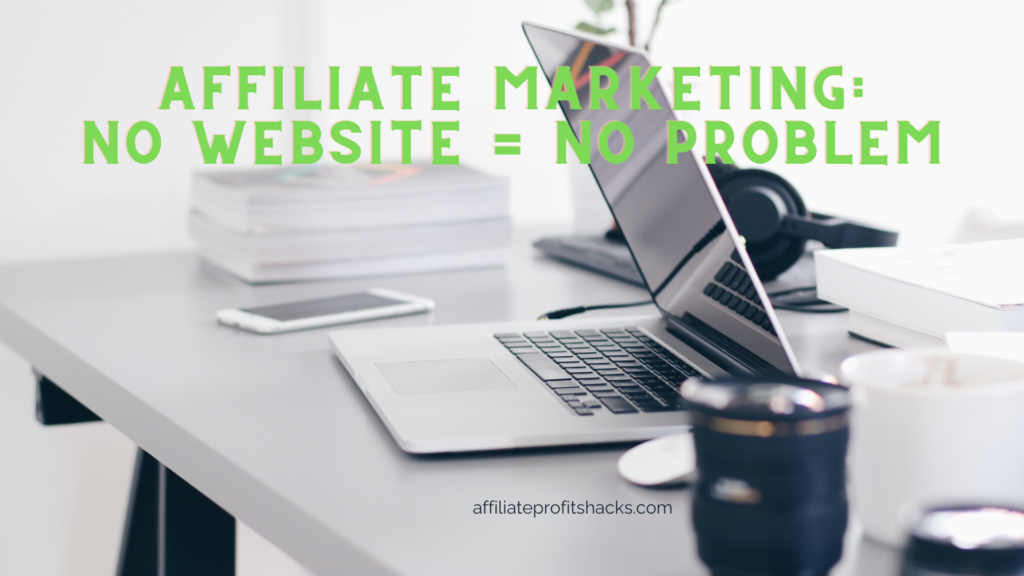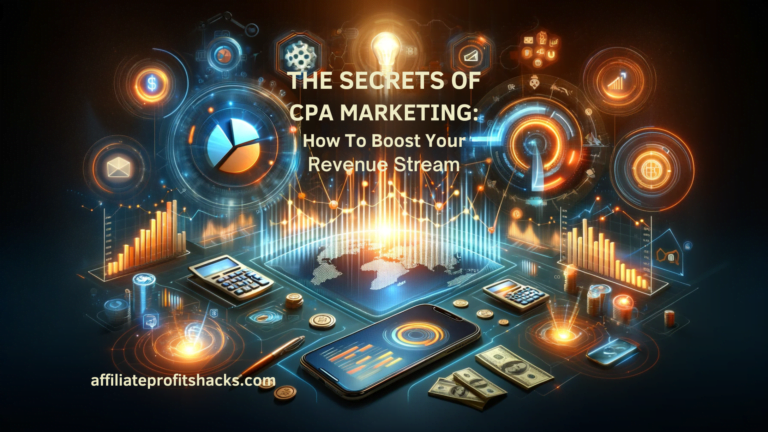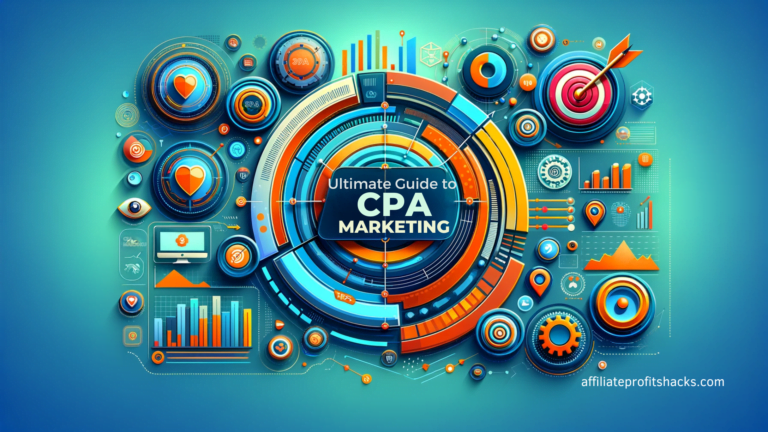Affiliate Marketing Without a Website: Is It Possible?
Welcome to my article about affiliate marketing without a website. Spoiler alert: it is possible!
Have you ever dreamed of making money online through affiliate marketing, but the idea of building and maintaining a website seemed daunting? Trust me, I’ve been there.
When I first started my affiliate marketing journey, I had no experience in website development, and the thought of coding and designing a website from scratch felt overwhelming. But then I discovered that you can actually do affiliate marketing without a website.
No More Gimmicks, Just Real Results: Start Your Journey HERE<<

Yes, you read that right! You don’t need a website to start earning affiliate commissions. Some alternative strategies and channels can help you promote affiliate products effectively and generate sales without the hassle of building and managing a website.
In this article, we will explore various strategies and techniques to do affiliate marketing without a website. Whether you’re a beginner just dipping your toes into the world of affiliate marketing or a seasoned marketer looking for new ways to expand your reach, this guide will provide you with valuable insights and actionable tips.
Key Takeaways:
- Building a website is not a requirement for affiliate marketing success.
- Alternative channels such as social media platforms, YouTube, online forums, email newsletters, and guest posting on blogs can be leveraged for affiliate marketing without a website.
- It is important to choose the right affiliate marketing strategies and implement them effectively to maximize conversions and earnings.
- Transparency, credibility, and providing value to your audience are key principles for success in affiliate marketing without a website.
- By following the strategies outlined in this guide, you can start earning affiliate commissions without the need for a website.
Promoting Affiliate Links on Social Media Platforms
Social media platforms like Instagram, TikTok, Facebook, YouTube, and Pinterest offer excellent opportunities for affiliate marketing without a website. With these platforms, you can build a strong social following and share engaging content that attracts followers interested in your niche. This allows you to effectively promote affiliate products through posts, stories, or videos.
Utilizing various social media tools and features can enhance your affiliate marketing efforts. For example, link-in-bio tools enable you to include multiple affiliate links in your bio, making it easier for your followers to access the products you recommend. Swipe-up links, available on platforms like Instagram and Snapchat, allow you to direct your followers to specific landing pages or product pages.
Social media platforms like Instagram, TikTok, Facebook, YouTube, and Pinterest offer excellent opportunities for affiliate marketing without a website.
In addition, affiliate marketing programs like Shopify Collabs provide a platform where brands collaborate with influencers and offer exclusive affiliate partnerships. This allows you to monetize your social media presence by partnering with relevant brands and earning commissions for each sale generated through your affiliate links.
It is crucial to create high-quality, engaging content that resonates with your audience. Use compelling visuals, informative captions, and relevant hashtags to increase the visibility of your posts and attract more followers. Interacting with your audience through comments, messages, and live sessions can also help in building a loyal community.
“Utilizing various social media tools and features can enhance your affiliate marketing efforts.”
By leveraging the power of social media, you can reach a wide audience, establish yourself as an authority in your niche, and drive conversions through your affiliate links. Take advantage of the diverse features and functionalities offered by different social media platforms to maximize your affiliate marketing success. Keep in mind that building genuine connections, providing valuable content, and maintaining transparency and authenticity are key to long-term success in social media affiliate marketing.
Using YouTube for Affiliate Marketing
YouTube is a powerful platform for affiliate marketing without a website. With its massive user base and traffic-generating potential, YouTube offers a valuable opportunity for affiliate marketers to reach a wide audience and promote affiliate products effectively. By creating compelling video content that incorporates affiliate products and strategically placing affiliate links in the video descriptions, you can drive traffic and earn commissions through YouTube.
Creating Engaging Videos to Promote Affiliate Products
When leveraging YouTube for affiliate marketing, it’s essential to create engaging videos that resonate with your target audience. Different video styles, including product reviews, product comparisons, how-to guides, unboxing videos, and best-of videos, can all be effective in showcasing affiliate products and enticing viewers to make a purchase.
For instance, if you’re promoting beauty products as an affiliate marketer, you can create tutorial videos demonstrating how to achieve specific looks using the products. By showcasing the results and highlighting the benefits of the affiliate products, you can capture the attention of your viewers and inspire them to click on your affiliate links.
Strategic Placement of Affiliate Links in Video Descriptions
Once you’ve created compelling videos, it’s crucial to strategically place your affiliate links in the video descriptions. Be sure to craft informative and persuasive descriptions that provide additional details about the featured products and why viewers should consider purchasing them.
Include your affiliate links near the beginning of the video description to increase visibility and encourage viewers to click through. You can also add relevant keywords and calls-to-action to further entice viewers to explore the affiliate products.
Optimizing Your YouTube Channel for Affiliate Marketing Success
To maximize your success with affiliate marketing on YouTube, it’s essential to optimize your channel for visibility and engagement. Here are some tips to consider:
No More Gimmicks, Just Real Results: Start Your Journey HERE<<
- Create a visually appealing channel banner and profile picture that aligns with your niche and showcases your brand.
- Use relevant keywords in your video titles, descriptions, and tags to improve discoverability.
- Encourage viewers to subscribe to your channel and turn on notifications to stay updated on your latest videos.
- Engage with your audience through comments, likes, and shares to build a loyal following.
- Promote your YouTube videos on other social media platforms to expand your reach.
With these strategies in place, you can leverage YouTube’s vast user base and monetize your content through affiliate marketing.
YouTube offers a unique opportunity for affiliate marketers to showcase their expertise, promote affiliate products, and earn commissions without the need for a website. By creating engaging videos and strategically placing affiliate links in video descriptions, you can leverage YouTube’s massive traffic and reach a wide audience. Remember to optimize your channel and engage with your viewers to maximize your success.
Using Paid Advertising on Search Engines
Generating organic traffic from search engines without a website can be challenging, so many affiliate marketers without a website rely on paid advertising, specifically search ads. Pay-per-click (PPC) advertising involves bidding on keywords related to the affiliate products being promoted. Google’s PPC ads are placed at the top and bottom of search engine results pages, and they can drive targeted traffic to affiliate links.
With PPC advertising for affiliate marketing, you have control over your ad budget and can set specific targeting options to reach your desired audience. By choosing relevant keywords and creating compelling ad copy, you can attract potential customers who are actively searching for products or services related to your affiliate offers.
It is crucial to carefully plan and target your ads to maximize conversions and ensure a positive return on investment. Conduct thorough keyword research to identify high-converting keywords and optimize your ad campaigns based on user search intent. Continuous monitoring, testing, and optimization of your PPC ads will enable you to refine your strategies and improve your ad performance.
Remember to analyze your ad campaign data and adjust your targeting, budget, and messaging as needed. By monitoring your ad metrics and optimizing your ads based on performance insights, you can drive more traffic to your affiliate links and increase your chances of earning commissions.
Pro tip: When running PPC ads for affiliate marketing, it’s important to comply with search engine advertising policies and guidelines to avoid any potential penalties or account suspension.
Benefits of using paid advertising for affiliate marketing:
- Immediate visibility: Paid ads can quickly put your affiliate offers in front of your target audience.
- Targeted traffic: With advanced targeting options, you can reach users who are likely to be interested in your affiliate products.
- Increased conversions: Well-optimized PPC ads can drive highly relevant traffic to your affiliate links, increasing your chances of converting that traffic into sales.
- Scalability: Paid advertising allows you to scale your affiliate marketing efforts by increasing your ad spend as your campaigns become more profitable.
- Data-driven optimization: The data obtained from your paid ad campaigns can provide valuable insights to refine your marketing strategies and improve overall performance.
Adding paid advertising to your affiliate marketing arsenal can help you overcome the challenges of generating organic traffic without a website. By leveraging the power of search engine ads, you can effectively promote your affiliate products and boost your earning potential.
Leveraging Online Forums and Communities
Online forums and communities like Quora and Reddit offer valuable opportunities for affiliate marketers to engage with a targeted audience and promote their affiliate links without the need for a website. These platforms attract users who actively search for information on specific niche topics, making it easier for affiliate marketers to showcase their expertise, provide helpful recommendations, and direct users to their landing pages.
When participating in online forums and communities for affiliate marketing, it’s essential to focus on building trust and adding value to the conversations. By establishing yourself as a knowledgeable and reliable resource, you can gain the trust of other forum members and increase the likelihood of them clicking on your affiliate links. However, it’s crucial to adhere to the platform’s rules and guidelines to avoid any negative repercussions.
One effective strategy is to answer questions related to your niche that users have posted on these forums. By providing insightful and helpful responses, you can demonstrate your expertise and subtly promote relevant affiliate products or services. However, it’s important to strike a balance and avoid sounding too salesy or overly promotional.
Remember, the key to success in online forums and communities is to focus on building relationships and providing value. Take the time to understand the community dynamics, engage with other members, and contribute meaningfully to the conversations.
An additional way to leverage online forums for affiliate marketing is by linking to relevant blog posts or articles that contain your affiliate links within the content. This indirect approach allows you to showcase your knowledge and expertise while driving traffic to your affiliate offers.

Utilizing Email Newsletters
Email newsletters can be an effective tool for affiliate marketing without a website. By providing value to a specific target audience, building trust, and establishing authority in a niche, you can leverage email marketing to promote affiliate products and drive conversions.
No More Gimmicks, Just Real Results: Start Your Journey HERE<<
Your email newsletters should focus on delivering valuable content that resonates with your subscribers. This can include industry insights, tips and tricks, exclusive promotions, and other relevant information that your audience will find beneficial.
Within your newsletters, strategically incorporate promo codes, affiliate links, and targeted affiliate offers. Ensure that these promotions align with your subscribers’ interests and needs, increasing the likelihood of engagement and conversions.
One of the advantages of email marketing is the direct access it provides to your subscribers. This allows you to nurture relationships, build loyalty, and establish yourself as an authority in your niche. Over time, this trust and authority can translate into higher click-through and conversion rates for your affiliate links.
To optimize your email marketing strategy, consider using tools like Mailchimp, ConvertKit, or Constant Contact. These platforms offer features such as automation, segmentation, and analytics that can help you tailor your emails to specific audience segments, track performance, and optimize your campaigns.
Remember to always prioritize the quality and relevance of your content, as well as comply with email marketing best practices and regulations, such as obtaining proper consent and providing easy opt-out options for subscribers.
With the right approach, email newsletters can be a powerful channel for affiliate marketing, enabling you to reach and engage your target audience effectively.
Key points:
- Provide value and build trust with your audience through your email newsletters.
- Include promo codes, affiliate links, and targeted affiliate offers that align with your subscribers’ interests.
- Use email marketing tools to automate, segment, and track the performance of your campaigns.
- Prioritize quality content, comply with email marketing regulations and respect subscribers’ preferences.
Guest Posting on Blogs
Guest posting on relevant blogs is an effective strategy for affiliate marketing without a website. By creating valuable content for other blogs and including affiliate links in your posts, you can reach new potential customers and leverage the existing audience and credibility of established blogs.
When it comes to guest posting, finding blogs that accept guest contributions is the first step. Look for blogs in your niche that have a significant readership and accept guest posts. It’s important to adhere to their guidelines and provide high-quality, well-researched content that adds value to their readers.
Within your guest post, you can subtly promote affiliate products by including relevant affiliate links. However, it’s essential to focus on providing genuine recommendations and solutions rather than excessive self-promotion.
Guest posting not only helps you tap into a larger audience but also enhances your reputation and authority in your niche. When readers see your valuable content on reputable blogs, they are more likely to trust your recommendations, increasing the chances of generating affiliate sales.
Guest posting can be a powerful tool for affiliate marketers without a website. By partnering with established blogs, you can reach a wider audience and build credibility in your niche.
The key to successful guest posting is to create content that resonates with the blog’s audience and aligns with their interests. Focus on providing valuable information, actionable tips, and insights that readers can benefit from. By delivering high-quality guest posts, you can establish yourself as an expert in your field and attract more targeted traffic to your affiliate links.
Remember to always track your guest post performance. Monitor the click-through rates, conversions, and engagement generated by your guest posts. This data will help you identify which blogs and topics are most effective for your affiliate marketing efforts, allowing you to refine your strategy and achieve better results over time.
To further enhance the effectiveness of your guest posts, consider incorporating compelling visuals. Including relevant images, infographics, or screenshots can capture readers’ attention and make your content more engaging.
Offline Tactics for Affiliate Marketing
While online channels dominate affiliate marketing, there are opportunities for offline tactics as well. By utilizing offline strategies, you can expand your reach and promote affiliate products without relying solely on digital platforms.
Word of Mouth Marketing
One effective offline strategy for affiliate marketing is word-of-mouth marketing. By recommending products to your friends, family, and community members, you can leverage personal connections and generate sales. When you genuinely endorse a product you believe in, people are more likely to trust your recommendation and make a purchase.
Attending Events
Attending relevant events in your niche provides a valuable opportunity to promote affiliate products offline. Whether it’s trade shows, conferences, or networking events, these gatherings bring together like-minded individuals who may be interested in the products you are promoting. By actively engaging with attendees and sharing your affiliate links, you can generate leads and potentially earn commissions.
No More Gimmicks, Just Real Results: Start Your Journey HERE<<
Joining Local Groups
Another offline tactic is joining local groups that are related to the products you are promoting. This could be meetup groups, hobby clubs, or community organizations. By actively participating in these groups and building relationships, you can establish yourself as an authority and trusted resource. When the opportunity arises, you can then recommend affiliate products to members who may benefit from them.
Tip: Remember to always be genuine and transparent when promoting affiliate products offline. Your reputation and credibility are crucial, so only recommend products that you truly believe in and that align with the needs and interests of your audience.
Offline tactics, such as word-of-mouth marketing, attending events, and joining local groups, offer unique opportunities to connect with potential customers outside of the digital realm. By leveraging these strategies alongside your online efforts, you can maximize your affiliate marketing success.
Paid Advertising Strategies
Paid advertising is a powerful strategy for affiliate marketers looking to promote their products and drive traffic to their affiliate links. By leveraging paid ads, such as Pay-Per-Click (PPC) ads, you can specifically target your desired audience and maximize conversions. Here are some effective paid advertising strategies to consider:
- Keyword Research: Conduct thorough keyword research to identify the most relevant and high-converting keywords for your affiliate products. This will help you target the right audience and increase the chances of success with your paid advertising campaigns.
- Ad Copy Optimization: Craft compelling and persuasive ad copy that grabs the attention of your target audience. Highlight the unique selling points and benefits of the affiliate product you are promoting to entice users to click on your ad.
- Landing Page Design: Create dedicated landing pages that are optimized for conversions. These pages should showcase the benefits and features of the affiliate product and include a strong call-to-action that encourages users to take the desired action, such as making a purchase or signing up.
- A/B Testing: Continuously test different versions of your ads, landing pages, and call-to-action buttons to identify the most effective combinations. A/B testing allows you to optimize your paid advertising campaigns and improve their overall performance.
- Retargeting: Implement retargeting campaigns to reach users who have previously interacted with your ads or visited your landing pages. This helps to keep your brand top-of-mind and encourages users to return and complete the desired action.
Remember, successful paid advertising campaigns require careful planning, monitoring, and optimization. Regularly analyze your campaign metrics, adjust your targeting, and refine your strategies to achieve a positive return on investment (ROI) and maximize your affiliate marketing earnings.

Building Authority through Events and Webinars
Hosting events, whether in-person or virtual, is a powerful strategy for affiliate marketers to establish authority in their niche and promote affiliate products. By organizing engaging workshops, informative webinars, or community events, you can showcase your expertise, connect with potential customers, and generate interest in your affiliate offers.
Events provide a unique opportunity to interact directly with your target audience. You can share valuable insights, answer questions, and build strong relationships with attendees. By delivering valuable content and actionable tips, you can position yourself as a trusted authority in your industry.
During these events, you can also introduce attendees to your affiliate products by offering exclusive promo codes and affiliate links. This allows you to monetize your events while providing attendees with valuable resources and recommendations.
Events, whether they are held in-person or virtually, offer a chance to expand your network and establish credibility within your niche. By bringing together like-minded individuals and industry experts, you can create a supportive community that values your insights and recommendations.
Hosting webinars allows you to deliver in-depth knowledge and actionable strategies to a focused audience. You can share case studies, success stories, and practical tips that highlight the benefits of your affiliate products. By providing valuable information through webinars, you can nurture trust and build relationships with your audience, ultimately driving conversions and earning affiliate commissions.
Key Benefits of Building Authority through Events:
- Establish credibility as an expert in your niche
- Create a loyal community of engaged followers
- Connect with potential customers directly
- Generate interest in your affiliate products
- Offer exclusive promo codes and affiliate links
- Expand your network and form industry connections
By strategically hosting events and webinars, you can position yourself as a trusted authority, attract a dedicated audience, and drive conversions for your affiliate marketing business.
Conclusion
Affiliate marketing without a website is entirely possible through various channels and strategies. While having a website can simplify the process, it is not a mandatory requirement. By leveraging social media platforms, such as Instagram, TikTok, Facebook, YouTube, and Pinterest, affiliate marketers can promote their products and reach a niche audience.
No More Gimmicks, Just Real Results: Start Your Journey HERE<<
In addition, utilizing YouTube allows content creators to incorporate affiliate products into their videos and include affiliate links in the descriptions. Paid advertising on search engines, like Google’s PPC ads, can also drive targeted traffic to affiliate links. Online forums and communities, such as Quora and Reddit, provide opportunities to showcase expertise and direct users to affiliate offers.
Email newsletters can be a highly effective tool for promoting affiliate products, while guest posting on relevant blogs allows marketers to tap into established audiences. Offline tactics, such as word-of-mouth marketing and attending events, can also generate sales and referrals. By implementing these strategies and maintaining transparency and credibility, affiliate marketers can succeed in earning commissions without a website.
Thank you for reading my article “Affiliate Marketing Without a Website: Is It Possible?”. I hope you found it informative and helpful!
For more insights into affiliate marketing, take a look at this article: YouTube and Affiliate Marketing: Building a Profitable Partnership.







